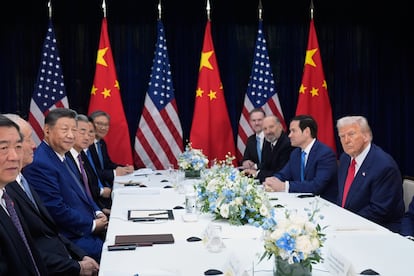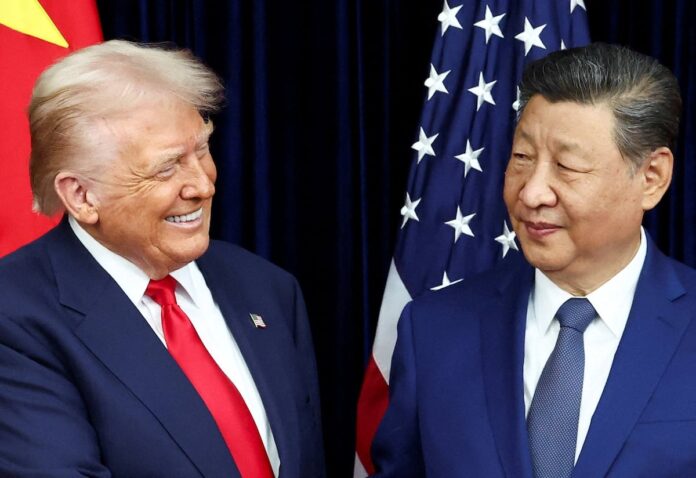Entente in Busan. U.S. President Donald Trump and his Chinese counterpart Xi Jinping finally met face to face after months of tension, and the meeting in the South Korean city resulted in several agreements, according to details provided by the Republican president after the meeting, aboard Air Force One on his way back to Washington. Trump assured that China has agreed to delay its restrictions on rare earth exports, one of the main points of conflict, for a period of one year, and announced an immediate reduction from 20% to 10% on the tariffs imposed in February on Chinese products due to Washington’s claim Beijing is not doing enough to stop exports of fentanyl precursors. Trump also said he would visit China in April and that Beijing would begin to buy large quantities of soybeans, according to several media outlets aboard the presidential flight. In addition, according to the Republican, the two leaders discussed the war in Ukraine: “We‘re both going to work together to see if we can get something done,” he said.
“I think it was an amazing meeting,” the Republican summed up. “All of the rare earth [issue] has been settled, and that’s for the world. It was a situation that affected everyone, not just the United States.”
China confirmed the agreements from Beijing. A Chinese trade spokesperson detailed in a press conference that the United States has committed to suspending the expansion of the list of entities subject to export controls for one year. This regulatory change introduced by Washington in September, which potentially affected thousands of subsidiaries of Chinese companies, had sparked Beijing’s fury: its response was to approve a series of additional restrictions on rare earths shortly thereafter, which in turn aroused Washington’s anger.
Now, the restrictions remain in limbo for the next 12 months. “China will suspend the implementation of the corresponding export control measures announced on October 9 for one year and will study the detailed formulation of specific plans,” said the trade spokesperson. Both sides have also agreed to pause — also for a period of one year — the new reciprocal port tariffs introduced a couple of weeks ago. And the Chinese government assured that consensus has been reached on “anti-drug cooperation on fentanyl, the expansion of agricultural trade, and the treatment of specific business cases.”

Likewise, the framework agreement for the sale of the popular Chinese video social network TikTok in the United States has been reinstated, as agreed in September during a meeting between Chinese and U.S. trade negotiators in Madrid, according to the Chinese spokesperson.
The meeting, the first between the leaders in six years, began at around 11:00 a.m. local time, according to Chinese media reports, and lasted around 100 minutes. “It is a great honor to be with a friend of mine, really, for a long time now, if you think about it,” Trump said in a flattering and positive tone at the start of the meeting, according to the White House channel’s broadcast on social media. “We will be having some discussions. I think we’ve already agreed to a lot of things, and we’ll agree to some more right now. President Xi is a great leader of a great country. We’re going to have a fantastic relationship for a long period of time, and it’s an honor to have you with us.”
Xi also said it was a pleasure to see Trump again. “It’s been many years,” he said at the start of the meeting. He recalled that since Trump’s re-election, they have spoken three times on the phone, exchanged several letters, and remained in close contact. Thanks to the guidance of both leaders, relations have remained “stable on the whole,” he said. “Given our different national conditions, we do not always see eye to eye with each other. It is normal for the two leading economies of the world to have frictions now and then,” the Chinese leader continued. But in the face of challenges, he concluded, leaders should ensure that relations “stay the right course.”
“Trade should remain the ballast and propeller of China-U.S. relations, not a stumbling block or source of conflict,” Xi said, according to the official reading provided by the Xinhua news agency. He called on both nations to avoid a “vicious cycle of retaliation.”
Previously, both leaders posed with broad smiles for photographers in front of their countries’ flags. “We’re going to have a very successful meeting, I have no doubt,” Trump announced after the handshake. “But he’s a very tough negotiator, that’s not good,” he added. “We know each other well. We have a great relationship.” Xi remained silent at his side. At the end of the meeting, in a gesture of closeness, Trump accompanied his Chinese counterpart to his car, followed by another handshake and smiles from both men.
The meeting was preceded by an air of cordiality on both sides, seeking to ease the battle they are waging on various fronts. This is the first physical meeting between the leaders since the Republican returned to the White House in January and unleashed a tariff war between the two powers that reached levels of de facto trade blockade last spring, dragging much of the world economy down with it.
In the run-up to the meeting, Xi stated that China’s development does not conflict with Trump’s vision of “making America great again.” The two countries “can fully complement each other and prosper together,” he said.
The Chinese leader also acknowledged Trump’s work in resolving international conflicts. “You care a lot about world peace, and you’re very enthusiastic about settling various regional hot spot issues,” he said, citing the ceasefire agreement in Gaza brokered by the Republican. He also recalled that last Sunday, the U.S. president witnessed the signing of a peace declaration on the border between Cambodia and Thailand. He expressed how China, for its part, has also been promoting dialogue and reconciliation on sensitive issues. “The world today is confronted with many tough problems. China and the U.S. can jointly shoulder our responsibility as major countries and work together to accomplish more great and concrete things for the good of our two countries and the whole world.”
The meeting, which was on the verge of being canceled in recent weeks, was made possible largely thanks to the negotiating teams from Washington and Beijing, who spent a weekend of intense debate trying to pave the way for their leaders. “We are going to have something that will be very, very satisfying for China and for us,” Trump announced on Wednesday night during a dinner with South Korean President Lee Jae Myung and other regional leaders on the sidelines of an Asia-Pacific forum. “I think it’s going to be a very good meeting. I’m looking forward to tomorrow morning,” he said.
After a seemingly calm summer, following Washington and Beijing’s agreement on a tariff truce in May, tensions flared up again in October after China deployed a new rare earth export control mechanism, which came as a blow to the White House. Beijing responded to what it considered a breach of the non-aggression pact by Washington, after the White House approved, among other measures, an expansion of the list of entities subject to export controls.
The meeting took place on the sidelines of the Asia-Pacific Economic Cooperation (APEC) summit in the city of Gyeongju, the ancient medieval capital of the Korean peninsula. But their face-to-face was held at the airport in neighboring Busan, as if it were an eclipse: with Trump about to take off to return to the United States and Xi having just landed to attend the summit. Trump, in fact, is skipping the official days of the leaders’ forum, which begins on Friday.
The meeting took place just days before the expiration of the truce on reciprocal tariffs agreed in May and extended in August, which ends on November 1 with the clock ticking down to its entry into force this Saturday and the threat of new 100% tariffs on imports from China — touted by Trump as retaliation for Beijing’s recent restrictions on rare earths — looming large.
Sign up for our weekly newsletter to get more English-language news coverage from EL PAÍS USA Edition
